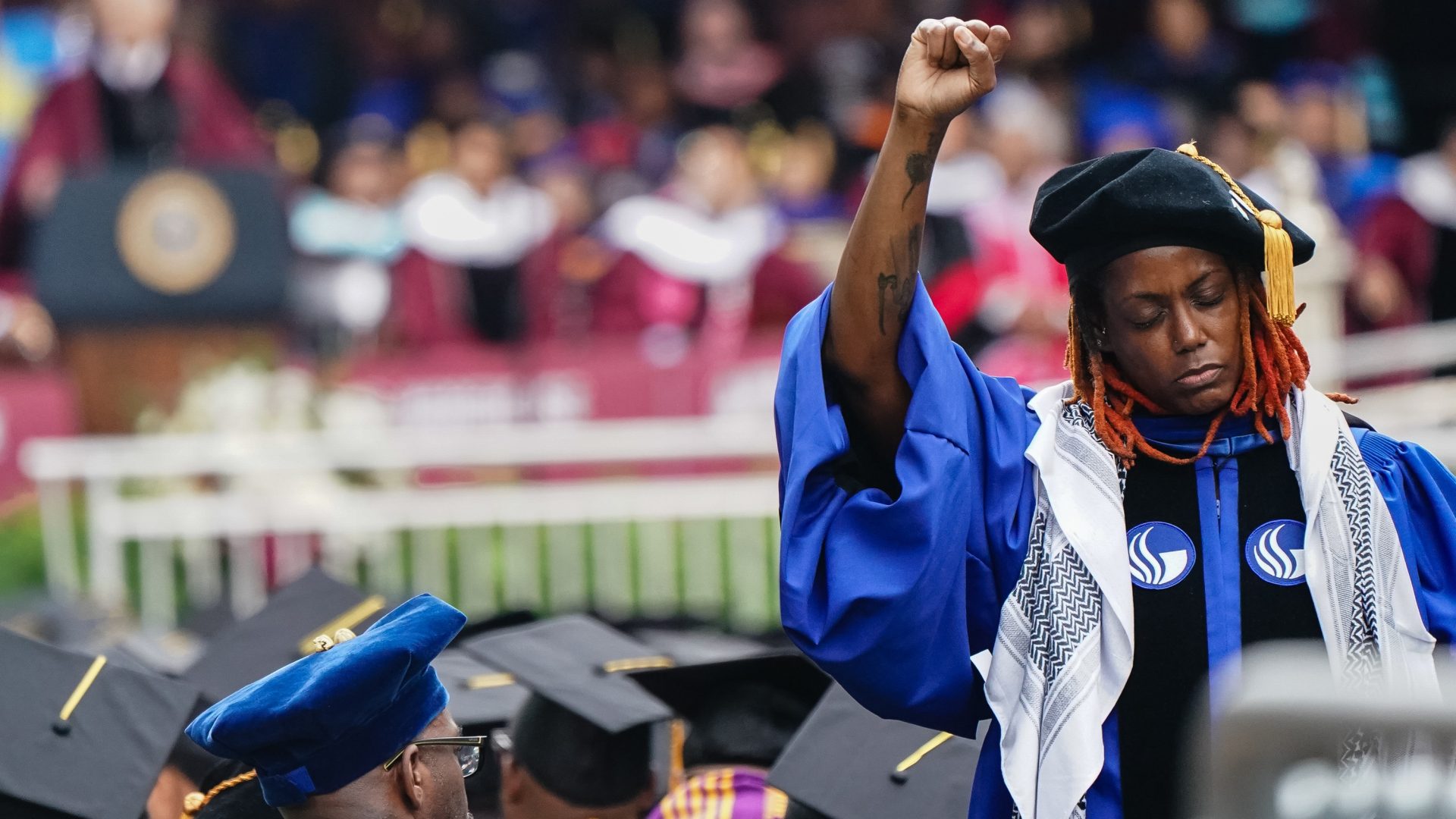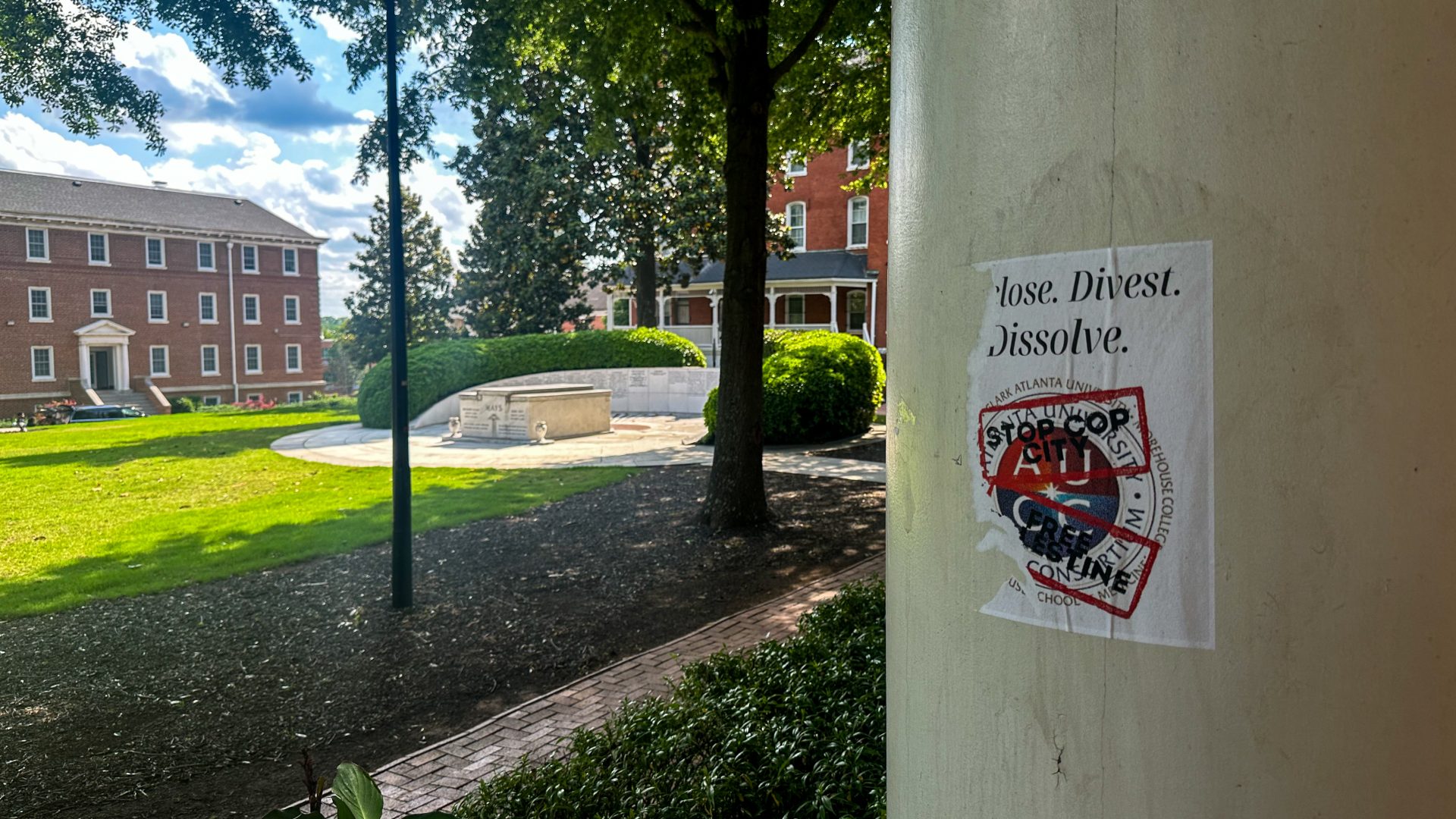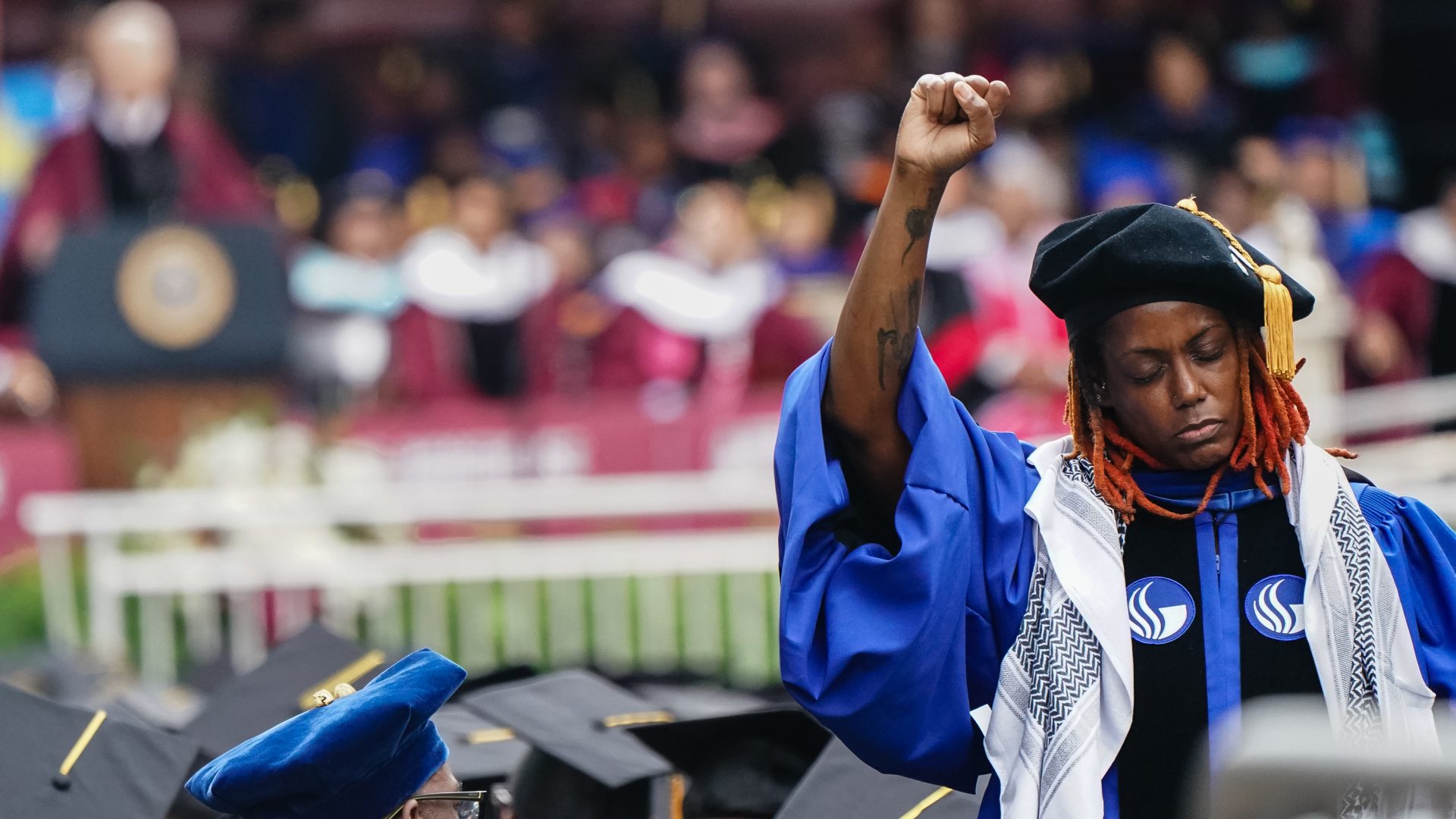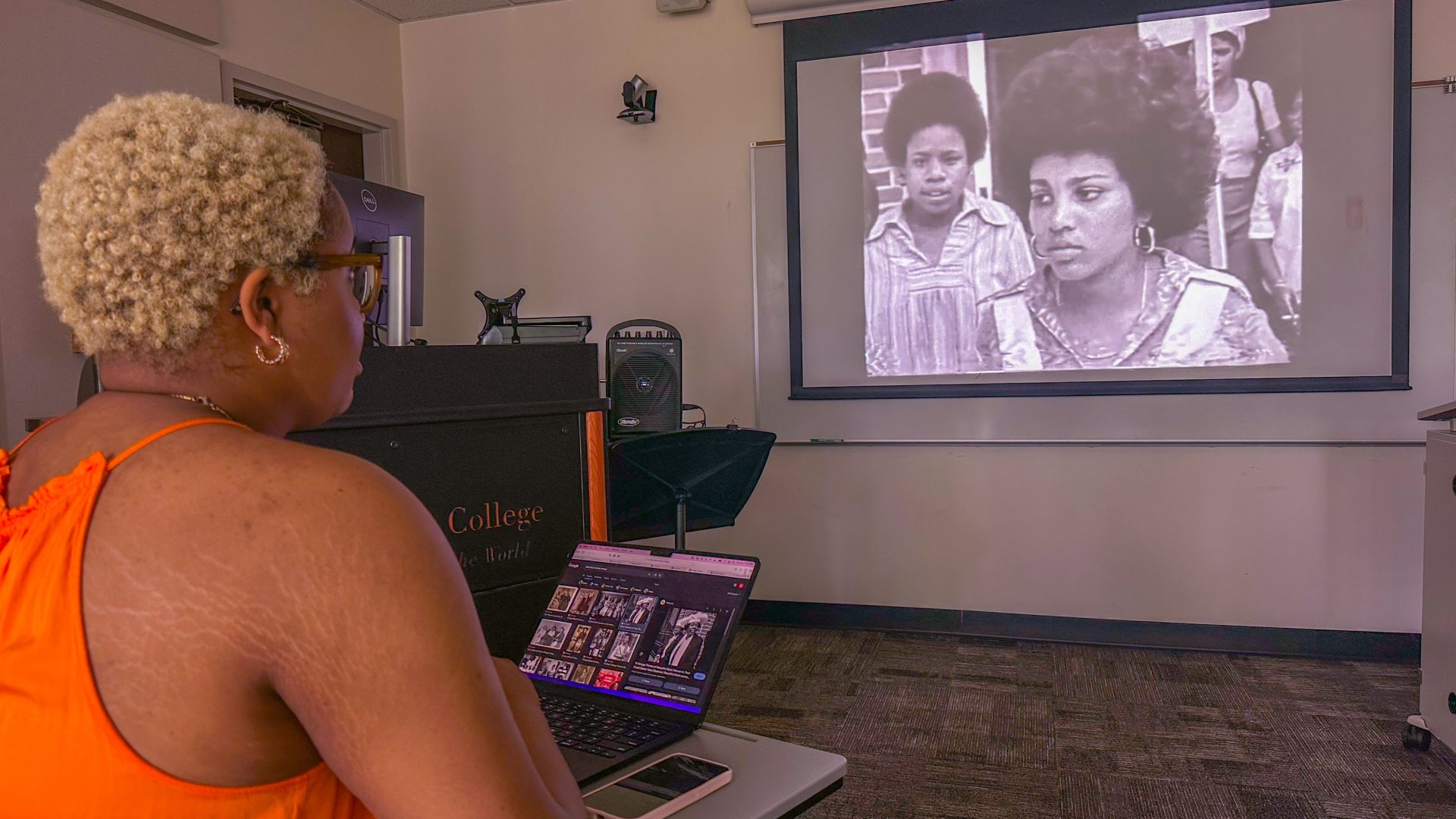
Morehouse junior Amir Childs was walking on campus, frustrated with his fellow Morehouse men after hearing that President Joe Biden was appointed this year’s commencement speaker. The news came days after a now viral video of Childs removing the Israeli flag and confronting university president David Thomas about the conflict in Gaza. He felt alone and conflicted in his cause of accountability.
“It’s like I’m battling between the stereotype of what the Morehouse man is supposed to be and the reality of it,” Childs tells GU.
Childs recalled spotting former student Samuel L. Jackson at the campus post office. After filling him in on what’s been going on, Jackson replied, “Well, what do you need from me?” Child’s response? “Just advice.” In 1964, Jackson was expelled from Morehouse for holding board members hostage for two days in a contest of accountability. “The administration is gonna try to break you,” Jackson told Childs. “Don’t get broken.”
Persuading Black voices to join the Palestine solidarity movement has proved daunting at this historically Black college. Unlike movements at Howard, Spelman, and Xavier, students at Morehouse and other HBCU campuses have remained mostly silent, choosing not to participate in encampments, a popular form of action nationwide in which students build small campsites and refuse to leave for weeks until they feel like their demands are met. Meanwhile, Childs feels like time is running out.

On May 19, 2024, President Biden spoke at Morehouse’s spring commencement ceremony. Leading up to commencement, there were different forms of student protest. According to Morehouse trustee Willie Woods, Biden was invited to the private HBCU almost a year ago but did not formally accept until March. Wanting to remain neutral in its stance against the war in Gaza, Woods felt that, as many say about the election, Morehouse has to choose the lesser of the two evils in this civil matter. Students were encouraged to be peaceful, not do too much, and take a strategic approach to change the world.
Read ‘Riot Pens: Diving Into The Complexities Of HBCU Activism’
“We can voice our discontent, but we will not disinvite him,” Wood says during a private meeting between Atlanta University Center organizers, some members of the board of trustees and alumni. “What a firestorm we are in. Disinviting Biden will make things worse.”
Ultimately, respectability politics has become the main issue throughout this entire experience on campus. “One of the things that we’re always hearing about, being faculty and community at Morehouse, is that we are Dr. King’s alma mater, and that we should stand up for social justice humanitarianism,” says Dr. Taura Taylor, Assistant Sociology professor on Democracy Now. “At the same time, we as a community, get another message from our administration in terms of how not to embarrass the college to be dignified and to engage in a certain form of respectability politics.”

At Spelman, there is a protesting policy that restricts the act which was implemented after the Spelman Lock-in of 1976. Similar to what Jackson did 11 years earlier, students held the board of trustees hostage in a room with rope because they wanted a Black woman to serve as president of the all-Black women’s college. The first Black woman president didn’t show up for another 10 years. Sydney Jael-Wilson, a third-year Comparative Women’s Studies major at Spelman College with a focus on activism, says Morehouse and Spelman teach their students the saying, “You can be successful and play into the system or not be successful.” Jael-Wilson and other Spelman students want to fight the notion that they are complacent.
“Black faces in high places are not going to save us,” Jael-Wilson tells GU, quoting Dr. Ruha Benjamin, the convocation speaker at last year’s Founders Day.
Although Morehouse did not disinvite Biden, it did not discourage students from expressing opinions, unlike other higher education institutions, which impose outside enforcement on students. According to the Morehouse College 2023-2024 Catalog, “Morehouse College fully supports the right of students to assemble peacefully and express themselves in an orderly manner.” The university has scheduled private sessions for students to hold civil discourse, however respectability politics is what frustrates Childs who refers to Morehouse as an ‘assimilation school’ putting the interest of its brand before the students.
On one hand, students feel protesting is welcomed in theory at HBCUs, but on the other respectability politics is paralyzing, making accountability a hard practice. During commencement Valedictorian DeAngelo “DJ” Fletcher called for an immediate and permanent cease-fire in Gaza in his speech before the president’s address, but still, what’s the line between disagreeing on a topic and sitting down and talking about it, or when does it become respectful politics? It’s becoming a fault line between Biden and the student-led Palestinian movement. With tensions on campus escalating ahead of commencement, administration doesn’t want to cause an earthquake between election candidates or religious groups.
“President Thomas is hypocritical,” says Jael-Wilson. “Frequently sending inflammatory emails encouraging student protests against his decisions, yet when Morehouse or other AUC students exercise their rights to protest, campus police and administration are deployed, often resulting in verbal altercations threatening punishment.”

Some Morehouse students are disappointed in the university, feeling tricked after weeks of conversations with the board of trustees and facility. They find similarities in their stage of events and “School Daze” the 1988 movie directed by legendary Morehouse alumni Spike Lee. He considers this a defining moment in modern and Morehouse history.
As graduation approached, the Morehouse administration challenged its men to be intentional about the change they wanted to see. In the end, Childs decided to have a vision rather than respond to the environment around him. He ultimately decided not to attend commencement in order to concentrate on his internship and choose an alternative course of action to bring about change.
About the Author: Nabou Ramu, born Seynabou Clark, is an afrocentric journalist who covers all things art, culture, and business. The griot’s word is an album for archiving and preserving time and memory within those beats. She is jazz to classical, documentaries to cinema, a ratio of soulful truth and naturally practiced. When she’s not writing, she is playing her saxophone, La Sirene, or painting.